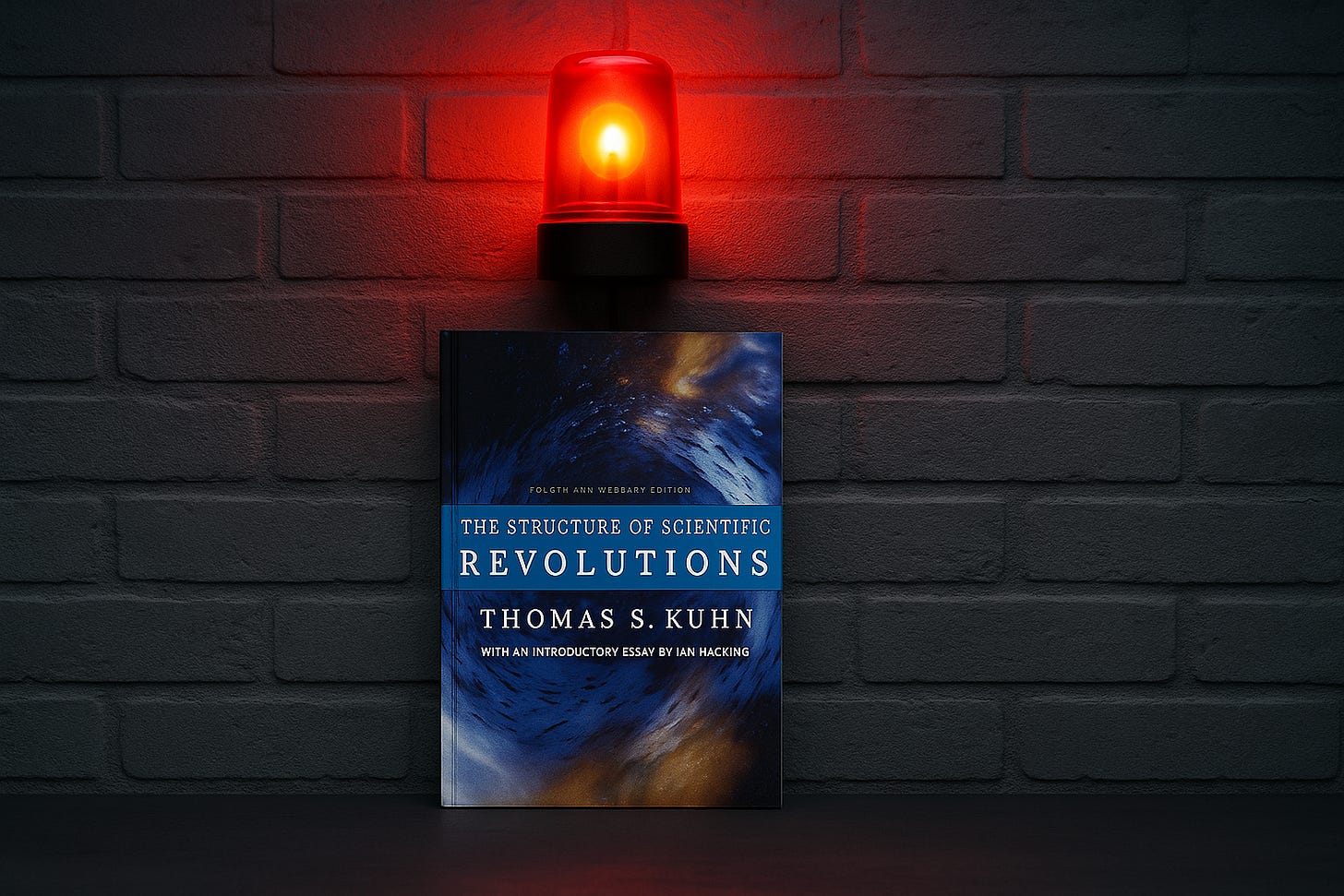The Kuhn Alarm Bell
Can a single quote cast doubt on an entire argument?
Whenever an author cites Thomas Kuhn’s The Structure of Scientific Revolutions, an alarm bell goes off in my head. It’s a cue to raise the level of intellectual scrutiny—because something is amiss.
Consider this passage from All Things Shining by Hubert Dreyfus and Sean Dorrance Kelly:
But the movement from Homer’s understanding of human excellence to Aeschylus’s is no more rational than the movement from Aristotle’s understanding of science to Galileo’s. As Thomas Kuhn points out, the transition from one scientific paradigm to the next is a complete Gestalt shift that is inexplicable precisely because it leaves nothing by means of which to explain it. There is no rational relation between Aristotle’s account of motion and Galileo’s; the two are simply incommensurate. And so it is with Homer and Aeschylus. We can say something about what each has that the other does not, but we cannot tell a story about why and how history made the transition from one to the next.
The authors use Kuhn to frame the cultural gap between Homer and Aeschylus—drawing a parallel to scientific revolutions. The citation adds a sense of authority and scientific veneer to the argument.
Dreyfus and Dorrance Kelly posit that the difference between Homer and Aeschylus is as radical as that between Aristotle and Galileo.
But here’s the problem: the shift from Aristotle to Galileo is entirely explicable.
Aristotle built his ideas on motion from observation and intuition, but without systematically testing them. When Galileo came along, he gave explanations grounded in mathematics—explanations that could be tested and verified.
But—and here’s where Dreyfus and Dorrance Kelly went wrong—Galileo didn’t replace Aristotle with an inexplicable shift. Galileo revealed the errors in Aristotle’s framework and corrected them.
The idea that the transition “leaves nothing by means of which to explain it” is exactly backward. Every scientific advance builds on the past by correcting mistakes and offering better explanations.
The equations in a new successful theory may look radically different, but its explanations must contain and account for the old ones—at least in the domains where the old ones worked.
Science does not advance in the way Kuhn describes. But his ideas remain popular because it’s emotionally satisfying.
As David Deutsch writes in The Fabric of Reality:
This Kuhnian view of the scientific process seems natural to many people. It appears to explain the repeated, jarring changes that science has been forcing upon modern thought, in terms of everyday human attributes and impulses with which we are all familiar: entrenched prejudices and preconceptions, blindness to any evidence that one is mistaken, the suppression of dissent by vested interests, the desire for a quiet life, and so on. And in opposition there is the rebelliousness of youth, the quest for novelty, the joy of violating taboos and the struggle for power. Another attraction of Kuhn’s ideas is that he cuts scientists down to size. No longer can they claim to be noble seekers after truth who use the rational methods of conjecture, criticism and experimental testing to solve problems and create ever better explanations of the world. Kuhn reveals that they are just rival teams playing endless games for the control of territory.
[…]
But considered as a description or analysis of the scientific process, Kuhn’s theory suffers from a fatal flaw. It explains the succession from one paradigm to another in sociological or psychological terms, rather than as having primarily to do with the objective merit of the rival explanations. Yet unless one understands science as a quest for explanations, the fact that it does find successive explanations, each objectively better than the last, is inexplicable.
When authors cite Kuhn, it suggests they found the idea compelling enough to include it, and they thought it would strengthen their argument—without questioning whether it’s actually true. Ask yourself, is it a one-off lapse, or part of a broader pattern—one I can’t detect because I’m not familiar with the rest of the subject matter?
Once I come across a Kuhn citation, I can’t help taking everything else in the book with skepticism.
But let’s remember: There are many more ways to be wrong than to be right. Errors are inevitable. In our infinite ignorance, we’re all equals.
As Feynman warned, “you are the easiest one to fool.” How many ideas do we accept because they resonate with our echo chamber? And which quotes have we been citing without scrutiny?
The Kuhn alarm bell is a wake-up call to remain alert—with other people’s work and, more importantly, with our own.


